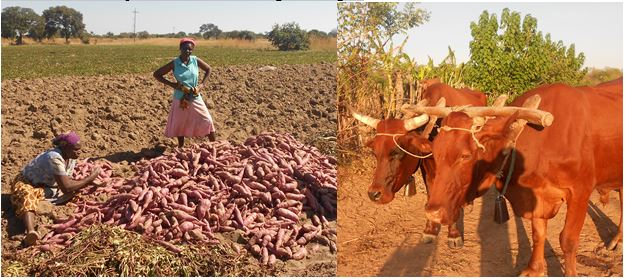While it is true that community knowledge is broader and deeper, most African farming communities hesitate to make decisions without consulting an extension officer. The need to cross-check and verify facts through an extension officer can be counter-productive if it causes farmers to stop experimenting and learning from their innovations. Surveys by eMKambo over the past three years have shown how smallholder farmers with less exposure to formal extension officers innovate more and are more confident of their own knowledge than those running to extension officers for every bit of advice. However, some farmers who figure out answers on their own tend to look down upon extension advice even in cases where it would be important to confirm existing knowledge.

Expert opinion versus evidence synthesis
The brain drain has not only affected developing countries who have lost the best talent to the developed world. Rural communities in developing countries have also lost their best talent to urban centres, the same way government institutions have lost the best talent to development agencies. Some of the most critical skills that have left rural areas for cities is the capacity to gather and synthesize local evidence into reliable knowledge. Short-term capacity building efforts like training in farming as a business or marketing initiatives introduced into communities by private companies selling seed or livestock breeds cannot build sustainable knowledge pillars without foundational pillars of knowledge like formal education systems. It is like planting seed when the soil is not ready. This is visible through communities’ excessive reliance on expert opinion from extension officers, veterinary doctors and nurses even on practices that should be very basic.
Although the sum total of community knowledge is way greater than that possessed by individual experts, several agricultural and rural development initiatives continue to be based more on expert opinion than on syntheses of existing knowledge. Local communities of practice that can consolidate existing evidence into practical procedures are lacking in most African rural areas. As a result, there is enormous depletion of knowledge and best practices that have kept the social fabric intact for generations. There is definite need for evidence-based agriculture and rural development. In the agriculture sector, this can take into account how farmers use pesticides so that corrective measures can be taken to ensure food safety for everyone. Simple tools for capturing, assessing and standardizing evidence on food safety should be developed and introduced to communities so such knowledge does not remain laboratory science.
Linking evidence to reality on the ground
The way farmers use evidence should translate to improved outcomes like better yields, more money in the pocket and a nutritious livelihood. The definition of research should not be limited to activities by researchers in formal research institutes alone. Instead, the way farmers conduct their own research and generate useful evidence for improving their practices should be considered an extension of many shades of practical research. As long as what communities are doing improves production practices, enhances practical science, provides accountability and maintains the ethical responsibility of farmers as researchers, it should qualify to be called research. That means, when governments set aside research budgets they should not just consider formal research stations but ordinary communities’ appetite for research and evidence generation. This can be the best way of decentralizing advantages for positive impact on development.
Empirically supported agriculture and rural development are an integral part of a knowledge economy. Assessing a community’s readiness to accept new ideas requires practical research in the right context. Farmers who receive an empirically supported seed variety or livestock breed get significantly better yields than those with no access to such advantages. However, the main challenge is fragmentation of manuals among government extension services, development agencies and the private sector with no point at which the manuals can be distilled into a single user-friendly practical tool.
On the other hand, strategies for teaching evidence-based interventions are falling short, with little evidence of transfer between the classroom and the workplace or the research station to farming community. While extension officers can learn the rudiments of an intervention at college or university, it is in the practice context that they will develop their knowledge and begin to shift their approach. Methods of teaching evidence-based practice need to change, to become more routed in the practice environment within a community of learners. The sum of the community’s knowledge is greater than the sum of individual agricultural practitioner’s knowledge. As the collective of the group advances, so too does the individual’s knowledge. Knowledge acquisition within the context of a community of practice fosters continuous learning and shape the way communities adapt to new approaches.
charles@knowledgetransafrica.com / charles@emkambo.co.zw / info@knowledgetransafrica.com
Website: www.emkambo.co.zw / www.knowledgetransafrica.com
eMkambo Call Centre: 0771 859000-5/ 0716 331140-5 / 0739 866 343-6
